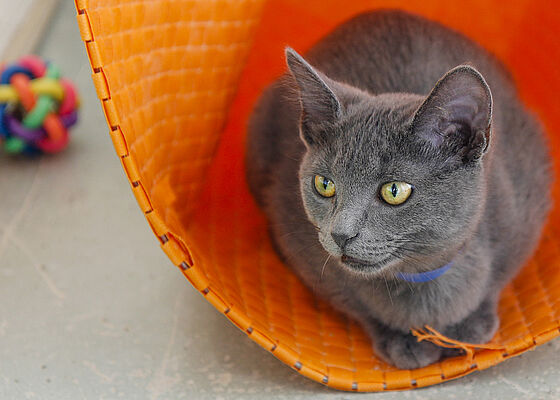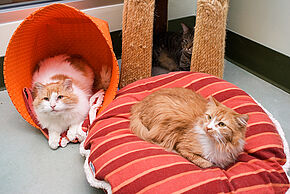Minimizing Stress
Cats find consistent routines and predictable environments very comforting. Play, meals and sleep should occur at approximately the same time every day.
During times of chaos (e.g., having workers in the house), place your cat in a room where he feels safe and secure and has all the necessities. Remember that cats find familiar scents very reassuring.
When you talk to a cat who is stressed, use a slightly higher than normal pitch to your voice and speak softly. Deep voices create fear, and loud voices can be grating on a cat’s sensitive ears.
If a stressor cannot be removed, reduce or eliminate stress by systematic desensitization and counter conditioning. By rewarding your cat with food and attention when you expose him to a feared stimulus, he learns to associate a pleasurable experience with the object he fears.
For example, being put in a carrier is a common source of stress for many cats. First, try leaving the carrier in a place your cat often rests. Keep bedding in the carrier and lightly spray it with calming pheromones (e.g. Feliway spray or Jackson Galaxy’s Spirit Essences line) to make it more comfortable and less frightening. Leading the cat to the carrier with treats will make the trips easier, as well.
Manifestations of Stress
A cat shows stress by changing his behavior. An extroverted cat may suddenly become nervous and reactive. An introverted cat may become immobile, sitting in a fixed posture for long periods of time.
Common signs of stress include:
- Inappropriate elimination (one of the most common responses)
- Territorial marking behaviors
- Excessive grooming or self-mutilation
- Immobility (depression) and hiding
- Redirected aggression toward people or other animals
- Excessive vocalization
- Loss of appetite
- Restlessness
Each of these signs, however, also can be a sign of illness or poor diet. If your cat is experiencing one or more of these symptoms, consult a veterinarian to rule out an illness or a nutrition problem.


